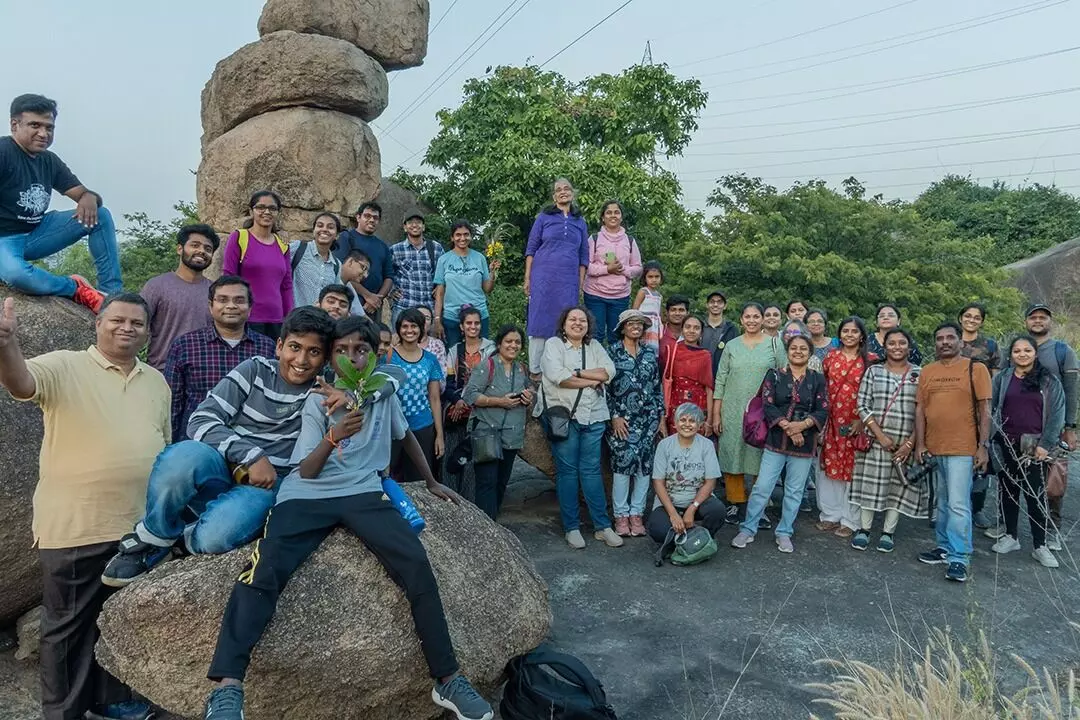Naturalist speaks: How to use nature to beat stress and anxiety
Naturalist in Hyderabad speak about how nature therapy helps in fighting depression and anxiety.
By Anoushka Caroline Williams
Members of Nature Lovers Community in Hyderabad
Hyderabad: Nature walks are low-cost and all-inclusive techniques to promote health and well-being. Nature therapy is always helpful in fighting depression and anxiety. Nature always boosts psychological well-being. Time spent in nature always promotes positivity and mental well-being. Low-intensity physical activity in nature such as walking relieves symptoms of sadness and anxiety. It has piqued the interest of the research community.
Nature always boosts psychological well-being. Time spent in nature always promotes positivity and mental well-being. Low-intensity physical activity in nature such as walking relieves symptoms of sadness and anxiety.The COVID-19 pandemic has fueled mental health problems in the general population. The potential of contact with nature to act as a community-level protective factor against mental health concerns has been proposed to minimize the harmful side effects of stress.
Kobita Dass Kolli is an amateur naturalist, observing and documenting the flora and fauna around her; the backyard, rocky outcrops, and mixed deciduous forests of the Hyderabad region. She is happy to light the spark of curiosity and share her findings on Tree Walks, talks, and social media. For the last 19 years, she and her friend are conducting gardening and nature awareness sessions for 4th standard students at Vidyaranya School. They formed `Nature Lovers’ in 2017. She is a graduate of Plant Sciences and Botany with an MPhil in Plant Physiology.
Talking to NewsMeter, she delved deep into her work and the results therein: Excerpts
How did Nature Lovers Begin?
“So while Sadhana (my partner) and I were busy doing our school activities, one of the parents suggested why don’t we come and do a tree walk for the students there and we agreed. one day. I think he was a Prof at IIIT. The surroundings were beautiful because it was a part of Central University. We went on a Sunday morning. The professors and their families showed up. It turned out to be a wonderful walk. Sadhana and I also learned a lot at that point, you know. Because I think for ever so long we were focused on ornamental trees rather than you know wild and then, suddenly we realized that, oh my goodness, there is so much more and the beauty is that in Hyderabad. You come across a lot of these wild species even in parks. So that was the beginning of Nature lovers” Kobita said.
What should we do to make nature part of our daily life?
Take your time. Reduce your speed a notch. Consider sauntering or strolling for leisure rather than rushing to a location. Slow down and take it all in.
Feel with all of your senses. Use your entire body to tune in: the warm air on your face, the sound of birds, the fragrance of flowers and the earthy smell of soil, the texture of leaves. Each sensation should be felt. Notice the tiny details that nature has to offer.
Modify your perspective. Glance up, look down, then sweep your eyes from left to right. And don't limit yourself to your vision. When you walk, pay attention to the crunch of your feet.
Take it easy. Nothing but your presence is required when you are out in nature. Set your need to do anything aside and turn off your cell phone. Plants, unlike technology, do not require us to click on anything; they signal quietly, therefore seek their cues. Remain for a bit. Choose a spot, settle in, and resist the impulse to move on. Nature, like the rest of life, will repay you
What does being in Nature teach you?
We, too, may benefit from nature's knowledge to better our mental, emotional, and physical health.
Nature teaches us to adapt to Changing Conditions.
It helps in cultivating cooperative relationships.
It teaches us the importance of resting, renewing, and regenerating.
Some Tips for Walking in Nature
Pay particular attention to birds and insects, the wind blowing through different leaves, and the noises of the dirt underneath.
Walk alone or stay quiet. It is tough to tune in to nature when you are talking.
Focus all of your senses on one object - a tree, a flower, or a rock. Take note of how it looks, smells, and feels.
Click pictures of species you may want to identify and learn more about later.